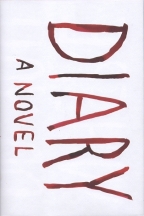Genre writing tends to be long on genre and short on writing.
Chuck Palahniuk's 'Diary' is a horror genre novel built on some of
the tightest, most disciplined writing you'll find in any novel. It's
a simple, swift read, but the effect that Palahniuk evokes is
complex, layered and lasts long after the last page is turned. Those
expecting a lot of shock-for-shock's sake will still be shocked, but
only by the fact that skillful writing can chill every bit as
effectively as overkill. With a razor-sharp wit Palahniuk shows that
he can disembowel Main Street America without offending it. 'Diary'
is a highly commercial novel that is relentlessly anti-commercial.
It's frightening because the truth laid bare is frightening. It's
also frightening because Palahniuk provides genre gratification by
executing his artistic ideals of minimalism and parading, not
sacrificing them. Like most Chuck Palahniuk novels, it's a bag full
of blades. There are so many sharp edges to cut yourself with, you
won't know you're bleeding until it's far too late.
'Diary' is written in the form of a coma diary, kept by Misty
Tracy Wilmot, whose husband Peter lies in a coma after a failed
suicide attempt. Shortly after the suicide, the phone calls begin.
Peter was a contractor, and his customers are calling to complain
that they've found the missing closets and rooms that disappeared
after he worked on the house. Inside those rooms, Peter has scrawled
vile and disturbing messages, some of them apparently meant for
Misty. Misty gave up her dreams of being an artist and married the
wealthy Peter only to end up working as a hotel maid on Waytansea
Island as the family money slowly dried up. Now she's being
threatened with lawsuits from dozens of homeowners. Her creepily
possessive mother-in-law is offering advice that strikes her as both
weird and unhelpful. 'Diary' documents her struggle to stay solvent
and keep her child fed, clothed, housed and alive.
Palahniuk has constructed an ingenious plot to drive his prose. He
draws on the history of horror and literature from sources as diverse
as Ira Levin and Henry James, but his plot is unique and highly
original. He evokes the supernatural awe of writers such as Ramsey
Campbell and Dennis Etchison, and the clever commonsense
plot-planning of writers such as Ruth Rendell and Elmore Leonard.
Like the best horror writers, he keeps the reader on edge wondering
whether the denouement will be a supernatural or natural revelation.
The details he's accumulated contribute nicely to the utterly
enjoyable payoff.
But 'Diary' isn't just about plot. While it reads like lightning,
'Diary' is a classy conceptual riff on narration, creation, art and
inspiration. Palahniuk's narrative voice deserves to be studied
closely. Ostensibly a simple first-person diary, in reality there are
many levels to the storyteller and the story told. Palahniuk's clever
plot is plunged into a mathematically constructed hall of narrative
mirrors. This enables Palahniuk to effortlessly create complex
perceptions of art history, art itself, the artistic process, the
writing process, and the process of creating an identity. Pursue any
single idea in any single direction and you'll encounter a world of
provocative permutations.
All of this happens without ay effort or realization on the
reader's part. Palahniuk is a masterful storyteller, and he's created
a number of compelling characters to tell his story. Misty Wilmot,
her mother-in-law Grace, Peter Wilmot and Angel Delaporte lock
together with puzzle perfection inside Palahnuik's plot and prose. Of
course, each Palahniuk book needs a lot of facts. In 'Diary' expect
to learn enough about coma victims to send shivers down your spine
while you can still move it, and enough about art technique and
history to inspire a trip the library if not the art supply store.
And each detail, each writerly technique goes to contribute to a
whole that is infinitely greater than the sum of the parts.
'Diary' is one of those rare novels that are simple and enjoyable
to read, yet it sets up echoes within the reader that will last for
days or months afterwards. It's also likely to draw the largest
audience yet for Palahniuk's writing. His barbs are just as sharp as
ever, his writing and wit remain intact, but his subject is far more
palatable than those treated in his other work. The result is that
'Diary' is in fact more powerful than his spikier previous novels.
The narrative layers employed by Palahniuk enable the reader to make
exciting conceptual cross-connections while reading the novel. The
shivers build slowly and last long after the novel is finished. The
plot is accessible and comprehensible even as the layers reveal
surprise after surprise. Watch out. While you're busy being stunned,
Palahniuk is doing unpleasant things to your mind.
